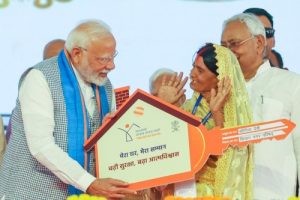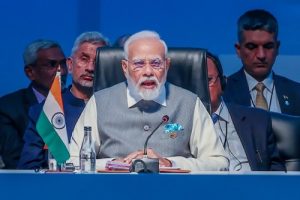The Supreme Court will take up on Friday the matter relating to Ram Janmabhoomi-Babri Masjid land dispute case as the three-member mediator panel is expected to submit its report in a sealed cover.
Karunesh Shukla, the lawyer of a litigant, Mahant Dharam Das, said that the mediation panel, which was set up by the apex court, might say what they have decided and what the outcome of the mediation process was.
“The mediation panel will submit its report in a sealed cover to the apex court five-judge bench, headed by Chief Justice of India Ranjan Gogoi, and also comprising Justices SA Bobde, DY Chandrachud, Ashok Bhushan and S Abdul Nazir,” Shukla told ANI.
The apex court had on March 8 constituted a three-member committee, chaired by retired top court judge Justice Fakkir Mohamed Ibrahim Kalifulla, for exploring possibilities of an amicable settlement to the land dispute. The panel also comprised of Sri Sri Ravi Shankar and senior Madras High Court advocate Sriram Panchu as members.
The Court had expressed the view that the proceedings must be conducted with “utmost confidentiality” to ensure its success.
“We have considered the nature of the dispute arising. Notwithstanding the lack of consensus between the parties in the matter, we are of the view that an attempt should be made to settle the dispute by mediation,” a five-judge Constitution bench of the apex court headed by Chief Justice Ranjan Gogoi had said.
In its order, the bench, which also comprised Justices SA Bobde, DY Chandrachud, Ashok Bhushan and S Abdul Nazeer, had said that the mediation proceedings will be held in Faizabad in Uttar Pradesh and the state government will provide the mediators with all facilities. “We are of the further view that to ensure success of the mediation proceedings the same should be held in Faizabad (Uttar Pradesh) and adequate arrangements in this regard including the venue of the mediation, place of stay of the learned Mediators, their security, travel, etc. should be forthwith arranged by the State Government so that the mediation proceedings can commence immediately which we expect to so commence within a week from today,” the bench had said.
It had said the mediators will be at liberty to co-opt other members of the panel, if needed, and can seek further legal assistance as and when required.
The bench had also said that the mediation process must be completed in eight weeks.
“We are also of the view that the mediation proceedings should be conducted with utmost confidentiality so as to ensure its success which can only be safeguarded by directing that the proceedings of mediation and the views expressed therein by any of the parties including the learned Mediators shall be kept confidential and shall not be revealed to any other person,” it had said.
The bench said, “We are of the further opinion that while the mediation proceedings are being carried out, there ought not to be any reporting of the said proceedings either in the print or in the electronic media.”
“However, we refrain from passing any specific order at this stage and instead empower the learned mediators to pass necessary orders in writing, if so required, to restrain publication of the details of the mediation proceedings. The Chairman of the Mediation Panel may also inform the Registry of this Court any difficulties that the panel may face in carrying out the task assigned to it by the present order and also to inform of any requirement to facilitate the mediation and to conclude the same at the earliest,” it had said.
It said, “We further direct that the mediation proceedings be held in camera as per the norms applicable to conduct of mediation proceedings. The Mediators may take such legal assistance as they may feel necessary at any stage of the mediation proceedings.”
“The panel of learned Mediators is requested to ensure completion of the process during the period of the interregnum indicated above (eight weeks) and send a report of the progress of the mediation to this Court within four weeks of the commencement of the process,” it added.
On March 6, the bench had reserved its order on the mediation issue, saying it was “looking at hearts, minds and healing if possible”, and that a “negotiated settlement” was the “best way to restore peace”.The bench was hearing appeals against the September 30, 2010 verdict of the Allahabad High Court which ordered a three-way division of the disputed 2.77 acres of the Ram Janmabhoomi-Babri Masjid site in Ayodhya between the Nirmohi Akhara sect, the Sunni Central Wakf Board, Uttar Pradesh and Ramlalla Virajman.
The bench had said it could only decide on the property and what it was looking at was “a possibility of healing relationships”. It had sought the views of the parties involved, citing Section 89 of the Code of Civil Procedure.Section 89 states: “Where it appears to the court that there exist elements of a settlement which may be acceptable to the parties, the court shall formulate the terms of settlement and give them to the parties for their observations and after receiving the observations of the parties, the court may reformulate the terms of a possible settlement and refer the same for (a) arbitration; (b) conciliation; (c) judicial settlement including settlement through Lok Adalat; or (d) mediation.
























